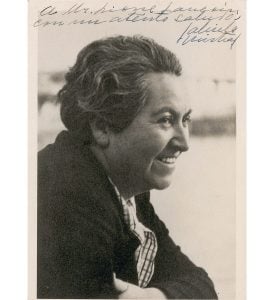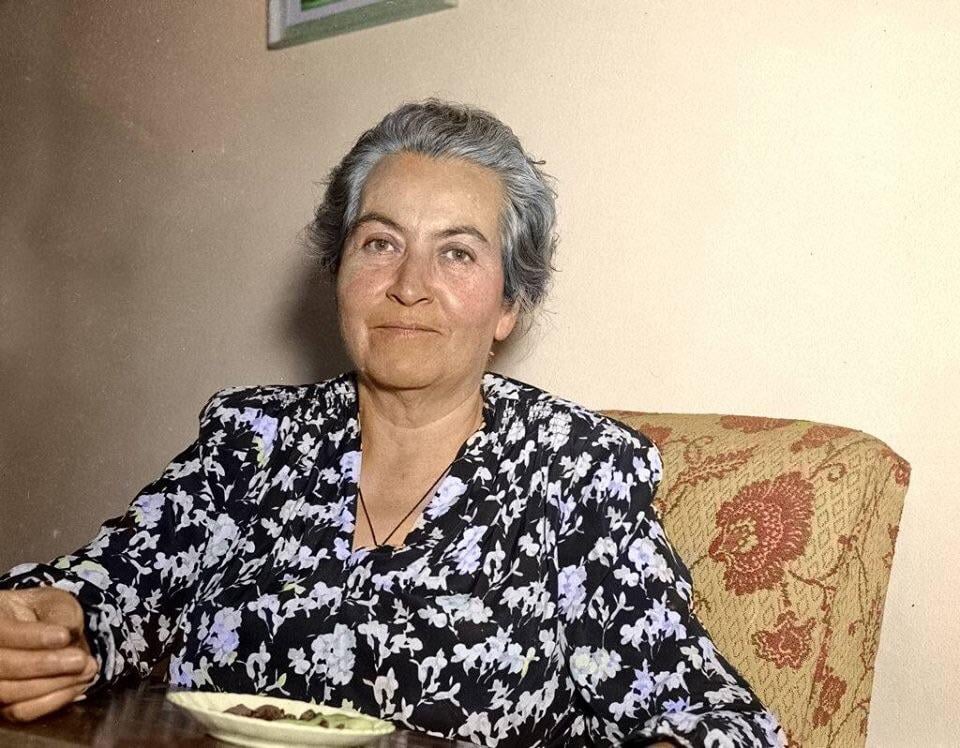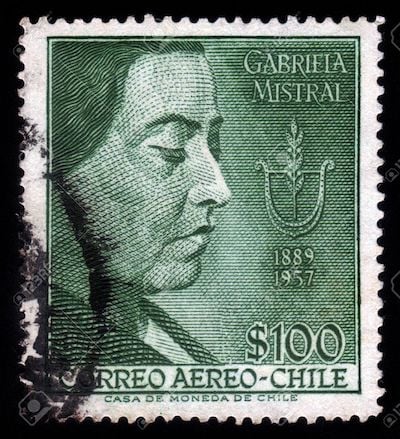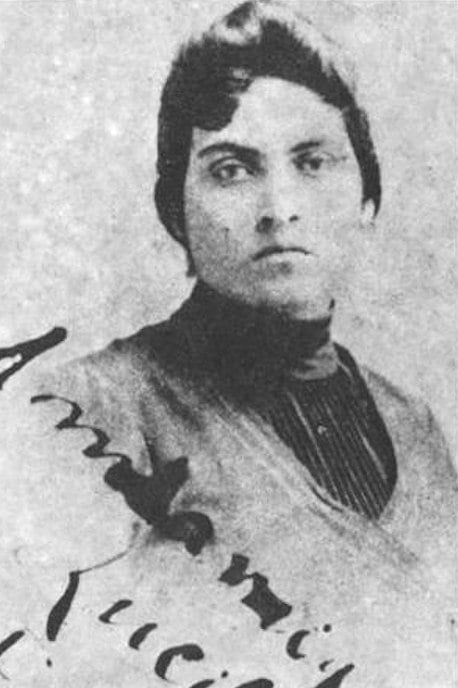9 Poems by Gabriela Mistral About Life, Love, and Death
By Skyler Gomez | On March 4, 2019 | Updated March 8, 2023 | Comments (7)

Gabriela Mistral (April 7, 1889 – January 10, 1957, born Lucila Godoy Alcayaga) was a Chilean poet, educator, diplomat, and feminist. Here you can sample nine poems by Gabriela Mistral about life, love, and death, both in their original Spanish (poemas de Gabriela Mistral), and in English translation.
In 1945, Mistral became the first Latin American to win the Nobel Prize for Literature.
Mistral stopped formally attending school at the age of fifteen to care for her sick mother, but continued to write poetry. Just two years later, her heart broke after the sad deaths of her lover, Romeo Ureta, and a close nephew.
These early losses would figure into her work for many years to come, the heartbreak leading her to create some of her best works, including Sonetos de la Muerte. Much of her later poetry was focused on the theme of death.
Here are the poems (in Spanish and English) you’ll find in this post:
- Canción de la Muerte / Song of Death
- Dame la Mano / Give me Your Hand
- Canto que Ambas / The Song You Loved
- Eligio de la Sal / In Praise of Salt
- Los Cabellos de los Niños / Children’s Hair
- Poemas de las Madres /Poems of the Mothers
- El Arte / Art
- El Girasol / The Sunflower
- Pan / Bread
First Latin American to win the Nobel Prize in Literature
Gabriela Mistral was the first Latin American author to receive the Nobel Prize in Literature. For more on the overarching themes in her work, see the analysis, “Beyond the Mythic Mistral.” She said of her own need to write:
“I write poetry because I can’t disobey the impulse; it would be like blocking a spring that surges up in my throat. For a long time I’ve been the servant of the song that comes, that appears and can’t be buried away.
How to seal myself up now? … It no longer matters to me who receives what I submit. What I carry out is, in that respect, greater and deeper than I, I am merely the channel.”
. . . . . . . . . . .

The Poetry of Gabriela Mistral: A Brief Overview and Analysis
. . . . . . . . . . .
Summing up Gabriela Mistral’s poetic journey
In Gabriela Mistral: The Poet and Her Work, Margot Arce de Vazquez summed up the life and work of this remarkable poet beautifully:
“This was the kind of woman she was: attentive to the present, dominated by the conscience of her deeds and of the course that history takes, incapable of refusing the claims of those who suffer from hunger or thirst for justice and love.
If we read her work carefully, we will find embodied there the same concepts and attitudes, and it would almost be impossible to distinguish between art and life or to say if there is more authentic poetry in her verses that in her acts.
Everything she did, said, and wrote was in some way saturated with that poetic air, revealing the marvelous, if somewhat delicate balance between the ‘is’ and the ‘should be.'”
In her Introduction to A Queer Mother for the Nation: The State and Gabriela Mistral, Licia Fiol-Matta observed:
“Mistral’s poetry is resolutely hermetic and often has a nightmarish quality. Even her nominally straightforward verses — those having to do with elements of nationalism, such as national symbology or national landscapes — contain a surreal quality.
Mistral surrounded herself with and was surrounded by metaphors of silence, shame, and secrecy. Much of her poetic oeuvre revolves around a private world difficult to decipher, a world of loss and despair, of fantasy escapes into other realities.”
Published poetry collections
Gabriela Mistral’s body of work includes six collections of her poetry (four of which were published in her lifetime) in addition to several volumes of letters and prose. Her first book, Desolación, was published in 1922 in New York City. It gained her an almost instant audience. This was followed by Ternura (Tenderness), published in 1924 in Spain.
Tala (Felling), published in 1938, is considered her most important book, at least on a par with Desolación. The last book published in her lifetime was Lagar (Wine Press), published in Chile in 1954.
The two posthumous collections were Poema de Chile (Poem of Chile), 1967, and Lagar II (Wine Press II), 1991, both published in Santiago, Chile.
. . . . . . . . . . .
Canción de la Muerte (Song of Death), 1914
La vieja Empadronadora,
la mañosa Muerte,
cuando vaya de camino,
mi niño encuentre.
La que huele a los nacidos
y husmea su leche,
encuentre sales y harinas,
mi leche no encuentre.
La Contra-Madre del Mundo,
la Convida-gentes,
por las playas y las rutas
no halle al inocente.
El nombre de su bautismo
la flor con que crece –
lo olvide la memoriosa,
lo pierda, la Muerte.
De vientos, de sal y arenas
se vuelve demente,
y trueque, la desvariada,
el Oeste, y el Este.
Niño y madre los confunda
los mismo que peces,
y en el dia y en la hora
a mi sola encuentre.
Song of Death
Old Woman Census-taker,
Death the Trickster,
when you’re going along,
don’t you meet my baby.
Sniffing at newborns,
smelling for the milk,
find salt, find cornmeal,
don’t find my milk.
Anti-Mother of the world,
People-Collector —
on the beaches and byways,
don’t meet that child.
The name he was baptized,
that flower he grows with,
forget it, Rememberer.
Lose it, Death.
Let wind and salt and sand
drive you crazy, mix you up
so you can’t tell
East from West,
or mother from child,
like fish in the sea.
And on the day, at the hour,
find only me.
. . . . . . . . . .

See also: 8 Fascinating Facts about Gabriela Mistral
. . . . . . . . . .
Dame la Mano (Give Me Your Hand)
Dame la mano y danzaremos
dame la mano y me amarás.
Como una sola flor seremos,
como una flor, y nada más…
El mismo verso cantaremos,
al mismo paso bailarás.
Como una espiga ondularemos,
como una espiga, y nada más.
Te llama Rosa y yo Esperanza:
pero tu nombre olvidarás,
porque seremos una danza
en la colina, y nada más.
Give Me Your Hand
Give me your hand and give me your love,
give me your hand and dance with me.
A single flower, and nothing more,
a single flower is all we’ll be.
Keeping time in the dance together,
you’ll be singing the song with me.
Grass in the wind, and nothing more,
grass in the wind is all we’ll be.
I’m called Hope and you’re called Rose:
but losing our names we’ll both go free,
a dance on the hills, and nothing more,
a dance on the hills is all we’ll be.
. . . . . . . . . .

. . . . . . . . . .
Canto que Amabas (The Song You Loved)
Yo canto lo que tú amabas, vida mía,
Por si te acercas y escuchas, vida mía,
por si te acuerdas del mundo que viviste,
al atardecer yo canto, sombra mía.
Yo no quiero enmudecer, vida mía.
¿Cómo sin mi grito fiel me hallarías?
¿Cuál señal, cuál me declara, vida mía?
Soy la misma que fue tuya, vida mía.
Ni lenta ni trascordada ni perdida.
Acude al anochecer, vida mía,
ven recordando un canto, vida mía,
si la canción reconoces de aprendida
y si mi nombre recuerdas todavía.
Te espero sin plazo y sin tiempo.
No temas noche, nebline ni aguacero.
Acude con sendero o sin sendero.
Llámame a donde tú eres, alma mía,
y marcha recto hacia mí, compañero.
The Song You Loved
Life of my life, what you loved I sing.
If you’re near, if you’re listening,
think of me now in the evening:
shadow in shadows, hear me sing.
Life of my life, I can’t be still.
What is a story we never tell?
How can you find me unless I call?
Life of my life, I haven’t changed,
not turned aside and not estranged.
Come to me as the shadows grow long,
come, life of my life, if you know the song
you used to know, if you know my name.
I and the song are still the same.
Beyond time or place I keep the faith.
Follow a path or follow no path,
never fearing the night, the wind,
call to me, come to me, now at the end,
walk with me, life of my life, my friend.
. . . . . . . . . .

Learn more about Gabriela Mistral
. . . . . . . . . .
Elogio de la sal (In Praise of Salt)
La sal que, en los mojones de la playa de Eva del año 3000,
parece frente cuadrada y hombros cuadrados,
sin paloma tibia ni rose viva en la mano
y de la roca que brilla
más que la foca de encima,
capaz de volver toda joya.
La sal que blanquea,
vientre de gaviota y cruje en la pechuga del pingüino
y que en la madreperla juega
con los colores que no son suyos.
La sal es absoluta y pura como la muerte.
La sal que clavetea en la corazón de los buenos
y hasta el de N.S.J. hará que no se disuelvan en la piedad.
In Praise of Salt
The salt, in great mounds on the beach of Eve in the year 3,000,
seems squared off in front and squared off in the back,
holding no warm dove nor living rose in its hand,
and the salt of the rock salt that gleams,
even more than the seal on its peak,
capable of turning everything into a jewel.
The salt that bleaches the seagull’s belly
and crackles in the penguin’s breast,
and that in mother-of-pearl plays
>with colors that are not its own.
The salt is absolute and pure as death.
The salt nailed through the hearts of good people,
even the heart of our Lord Jesus Christ, keeps them from dissolving in piety.
. . . . . . . . . .
Los cabellos de los niños (Children’s Hair)
Cabellos suaves, cabellos que son toda la suavidad del mundo:
Que seda gozaría yo si no os tuviera sobre el regazo?
Dulce por ella el dia que pasa, dulce el sustento,
dulce el antiguo dolor, solo por unas horas que ellos resbalan entre mis manos.
Ponedlos en mi mejilla;
Revolvedlos en mi regazo como las flores;
dejadme trenzar con ellos, par suavizarlo, mi dolor;
aumentar la luz con ellos, ahora que es moribunda.
Cuando ya sea con Dios, que no me de el ala de un ángel,
para frescar la magulladura de mi corazón;
extienda sobre el azul las cabelleras de los niños que ame,
y pasen ellas en el viento sobre mi rostro eternamente!
Children’s Hair
Soft hair, hair that is all the softness of the world:
without you lying in my lap, what silk would I enjoy?
sweet the passing day because of that silk, sweet the sustenance,
sweet the ancient sadness, at least for the few hours it slips between my hands.
Touch it to my cheek;
wind it in my lap like flowers;
let me braid it, to soften my pain,
to magnify the light with it, now that it is dying.
When I am with God someday, I do not want an angel’s wing
to cool my heart’s bruises;
I want, stretches against the sky, the hair of the children I loved,
to let it blow in the wind against my face eternally!
. . . . . . . . . .

The Early Poetry of Gabriela Mistral
. . . . . . . . . . .
Poemas de las madres (Poems of the Mothers)
Me ha besado y yo soy otra;
por el latido que duplica el de mis venas;
otra; por el aliento que se percibe entre el aliento.
Mi vientre ya es noble como mi corazón …
Y hasta encuentro en mi hálito una exhalación de flores:
¡todo por aquel que descansa en mis entrañas blandamente,
como el rocío sobre la hierba!
Poems of the Mothers
I was kissed, and I am othered: another,
because of the pulse that echoes the pulse in my veins;
another, because of the breath I feel within my breath.
My belly, now, is as noble as my heart …
And now I feel in my own breathing an exhalation of flowers:
all because of the one who rests inside me gently,
as the dew on the grass!
. . . . . . . . . .
El Arte (Art)
I. La belleza
Una canción es una herida amor que nos abrieron las cosas.
A ti, hombre, basto, solo te turba un vientre de mujer,
un montón de carne de mujer. Nosotros vamos turbados,
nosotros recibimos la lanzada de toda la belleza del mundo,
porque la noche estrellada nos fue amor tan agudo como un amor de carne.
Una canción es una respuesta que damos a la hermosura del mundo.
Y la damos con un temblor incontenible,
como el tuyo delante de un seno desnudo.
Y de volver en sangre esta caricia de la Belleza,
y de responder al llamamiento innumerable de ella por los caminos,
vamos más febriles, vamos más flagelados que tú,
nosotros, los puros.
Art
I. Beauty
A song is the wound of love that things open in us.
Coarse man, the only thing that arouses you is the woman’s womb,
a mass of female flesh. But our disquiet is continuous;
we feel the thrust of all the beauty of the world,
because the starry night was for us a love as sharp as carnal love.
A song is a response we offer to the beauty of the world.
And we offer that response with an uncontainable tremor,
just as you tremble before a naked breast.
And because we return, in blood, this caress of Beaut,
and because we respond to Beauty’s infinite calling through the paths,
we walk more timorously, more reviled than you:
we, the pure.
. . . . . . . . . .
El girasol (The Sunflower)
“Ya se el de arriba. Pero las hierbas enanas no lo ven
y creen que soy yo quien las calienta
y les da la lamedura de la tarde”.
Yo –ya veis que mi tallo es duro– no les contestado
ni con una inclinación de cabeza.
Nada engaño mio, pero las dejo encarnarse
porque nunca alcanzarán a aquel que, por otra parte,
las quemaría, y a mi en cambio hasta me tocan los pies.
Es bastante esclavitud hacer el son. Este volverse al Oriente y al ocaso
y ester terriblemente atento a la posición de aquel,
cansa mi nunca, que no agil.
Ellas, las hierbas, siguen cantando allá abajo:
“El sol tiene cuatrocientos hojas de oro,
un gran disco oscuro al centro y un tallo soberano”.
Las oigo, pero no les doy señal de afirmación con mi cabeza.
Me callo; pero se, para mi, que es el de arriba.
The Sunflower
“I know for certain it is he, the one up above. But the little plants don’t see him,
and they believe it is I who warms them
and licks them all afternoon.”
I – whose stem is hard, as you can see– I never answer them,
not even with a nod of the head.
It’s no deception on my part, but I let them deceive themselves,
because they will never reach him, who would burn them in any case.
As for me, on the other hand, they hardly even reach my feet.
It’s a form of great servitude to be the sun.
This turning towards the East and towards the sunset,
constantly attending to his position,
tires my neck, which is not so limber.
And they, the little grasses, they continue to sing down there:
“The sun has four hundred golden leaves,
a great dark disc at the center, and a sovereign stem.”
I hear them, but I offer them no confirming sign with my head.
I keep quiet, but as for me. I know for certain it is he, the one up above.
. . . . . . . . . .
Pan (Bread)
Vicio de la costumbre. Maravilla de la infancia,
sentido mágico de las materias y los elementos:
harina, sal, aceite, agua, fuego.
Momentos de vision pura, de audicion pura, de palpacion pura.
La conciencia de la vida en un momento.
Todos los recuerdos en torno de un pan.
Una sensación muy fuerte de vida trae consigo
>por no se que aproximacion interior, un pensamiento igualmente poderoso de la muerte.
El pensamiento de la vida banaliza desde el momento en que no se mezcla al de la muerte.
Los vitales puros son grandes superficiales o pequeños paganos.
El pagano se ocupó de las dos cosas.
Bread
Vice of habituation. Wonder of childhood,
magical feeling of raw materials and elements:
flour, salt, oil, water, fire.
Moments of pure vision, pure hearing, pure touch.
Consciousness of life at one moment.
All the memories revolve around bread.
It carries an intense sense of life, and also,
through I don’t know what internal association, an equally strong sense of death.
The thought of life turns banal from the moment it isn’t blended with the thought of death.
The pure essentials are superficial giants or little pagans.
The pagan paid attention to both.
. . . . . . . . . .
Skyler Isabella Gomez is a 2019 SUNY New Paltz graduate with a degree in Public Relations and a minor in Black Studies. Her passions include connecting more with her Latin roots by researching and writing about legendary Latina authors.
Great choices, Skyler 🙂
Thank you…
Thank you for posting these wonderful poems. Gabriela Mistral is my most favorite poet. I am originally from India but lives in Chicago for most of my life. I read a lot of poetry but have never been so passionate about any other poems except Gabriela Mistral’s.
Thank you, Lakshmy … she should be read and appreciated more!
Congratulations!
Muchísimas gracias por publicar estos poemas. They are devastatingly beautiful. Me encantan las traducciones también.
You’re very welcome! I wish Gabriela Mistral would be better known by readers. I only learned of her last year!